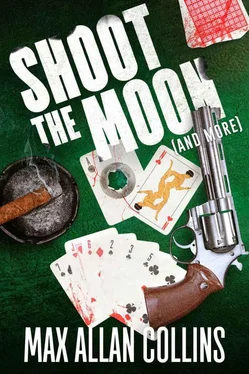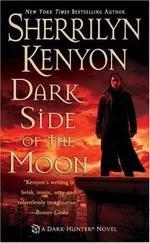“Gooooooood Eats, Hombres.”
“Burritos, Enchiladas and Tacos” and “Gringo Food, Too!” There were also bad paintings of little plump Mexicans wearing extravagant sombreros, sleeping under palm trees.
The Tacomobile pulled in two inches from the back bumper of the Mustang.
My mouth dropped open, and not from craving a taco. I walked unsteadily around the Mustang (there was a space of half a foot between it and the Highway Patrol car, so I could just squeeze through) and took a look at the front of the concession wagon, or rather the side of it, the part facing the street. There was more garish Tacomobile lettering on the bottom half, and more plump Mexicans taking siestas under palm trees; but the upper half was unpainted, as if they hadn’t gotten around to that yet, but then a panel dropped to reveal screened windows behind which food was cooked and served up and sold. The woman inside was a tiny middle-aged Chinese lady. Why was a Chinese lady running a Tacomobile, you ask? How should I know? I was busy wondering what a Tacomobile was doing pulled in behind the stolen Mustang, on an otherwise deserted street in Wynning, Iowa.
I was still wondering when the second concession wagon rolled in. It was much the same as the Tacomobile, only it
“Sno Cones,” and “Lemonade,” with poorly painted depictions of each. I mean, you had to sort of study it a while before deciding which picture went with which caption. I think the same artist did them as the Mexicans.
Along about then a band started to play.
From off in the distance. But not terribly far away, like from maybe two blocks. The song the band was playing was “Going Out of My Head,” performed in the style of John Phillip Sousa.
A marching band.
But what were they doing?
They were marching. And playing. They marched and played their way from the cafe two blocks down and ended up right there, in their stiff blue uniforms, all twenty-some of them, high school kids and a skinny young director with a sissy mustache, standing in front of the Wynning bank, the Highway Patrol car, the stolen Mustang, the Tacomobile and the cotton candy wagon. And me.
When they stopped playing, I asked the Chinese lady in the Tacomobile what was happening here.
She answered me in Chinese.
Then the director dismissed the band from what apparently had been a rehearsal, and they loosened their hot little collars and scattered around the street, chattering, shouting, mostly swarming around the two concession wagons. I backed away in horror. Some of these creatures were girls, but in those sexless uniforms it was hard to tell if anybody was human or not. A good-looking majorette with blond hair and a skimpy sparkly uniform was over talking to the director, but otherwise I felt engulfed by faceless, sexless blue uniforms.
“I told you to move your car,” somebody said, “and you wouldn’t listen.”
It was the Highway Patrolman with the dazzling badge, teeth and forehead.
“Well if you weren’t here for the day before,” he said, smiling that ugly smile you only find in people with no sense of humor, “you are now.”
And he walked away.
Across the street things were starting to happen.
I noticed the tent I’d seen those teenage boys starting to pitch was pitched. Some people were in the park. Not many, maybe half a dozen, men and women both, wearing clothes too formal and hot for the day, walking around in circles and looking official, carrying clipboards, wearing square plastic name badges.
I heard a scraping noise. Like an eight hundred pound man scraping a hundred pounds of fingernails across a four hundred pound blackboard. But it was only the two Highway Patrolmen, lugging this thing out into the street, hauling this huge saw-horse thing, the type you use to seal a street off with.
They were using it to seal off the street.
“Oh brother,” I said.
I glanced down in the other direction, to see if the street was sealed off that way, too.
It wasn’t. It wasn’t sealed off with a saw-horse thing. There was a bus, however, two blocks down, by the cafe, parked sideways in the street. The school bus the band came in, of course.
And over between the garage and the park, cars were parked in the street. Not along the street. In it. Cars belonging, apparently, to those official looking people wandering around the park with clipboards and plastic badges.
Right now one of those official-looking people, a male, was supervising while two of the teenage boys hung a banner over the entrance of the big tent.
The banner said:
WYNNING FOUNDER’S DAY — CENTENNIAL CELEBRATION
There was only one thing I could think of to do. I bought some cotton candy.
When I was sure the two Highway Patrolmen weren’t looking, I knocked on the door to the bank, then leaned against the building, eating my cotton candy.
I heard Elam’s voice say, “Things are gettin’ worse ain’t they, kid?”
“Well better isn’t the word.”
The cotton candy made an excellent cover for my talking to Elam. And it tasted pretty good, too. Trouble was I was wolfing it down. I was nervous.
Elam was saying, “What is this, some kind of celebration?”
“Founder’s Day. Centennial.”
“Yeah, yeah, I can just make out the banner over on that damn tent. Ain’t this a problem, though.”
“Elam.”
“Yeah, kid?”
“I’m leaving.”
“Not just yet, kid.”
“What’s stopping me?”
“Just a second. I’ll call Hopp over and let you ask him that.”
“Never mind. You make your point. What do you have in mind?”
“We’re comin’ out. Like I said before, we can’t exactly come outa here with a bag of money over our shoulder. Not at a time like this. So I figure we’ll leave the money inside for now.”
“Inside?”
“Right here in the bank. Can you think of a safer place? I’ll get the key to the front door from the manager, and we’ll just keep the bank locked up, for now.”
And before I could question the logic of that move, the door had eased shut again and I was alone with my cotton candy... and the high school band, concession stands, Highway Patrol...
A minute or so later Elam and Hopp strolled casually out of the bank, shutting the door (with its closed sign hanging in the window) behind them. Elam looked very cool. Hopp was a little wild-eyed, but probably not enough so to alert any innocent bystanders to anything unusual in his character. I had finished my cotton candy and didn’t know what to do with the paper cone the stuff had come wrapped around. I certainly didn’t want to throw it on the sidewalk, not with the cleanliness fetish this town had: getting busted for littering right now would’ve been less than ideal.
Elam gestured over toward the park, at the benches in front of the small bandshell. The only people in the park were the official types, their teenage helpers, and marching band members still taking five. Elam said, “Let’s go over there and sit down a minute and relax.”
That was a good idea. Relaxing was a terrific idea. I figured in a year maybe I would be able to relax again, but why not start trying now?
We picked our way through the marching band members who were standing and chatting and eating tacos and things in the street and sat on the bench in the first row in front of the bandshell, which was close enough to the edge of the street for the trees that surrounded the park to provide shade. So it was relatively cool there, in the shade, on those benches. Comfortable. Birdies were singing. Pretty shafts of sunlight came peeking through the shimmering green leaves of the trees. I thought I was going to barf.
Читать дальше












